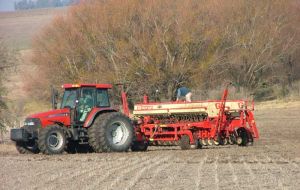MercoPress. South Atlantic News Agency
FAO targets 2050 and how to feed a population of 9.1 billion
 New food demands 80 billion USD in agriculture investment
New food demands 80 billion USD in agriculture investment The United Nations Food and Agriculture Organization said on Thursday major investment needs to be made in developing world agriculture. The FAO says that with rapid population growth and changing diets, agricultural production will need to grow by 70% before 2050.
The latest United Nations predictions on future world population say that by 2050 the world may be filled by 9.1 billion people. That's up over 30% from our current population of 6.8 billion.
Now, the FAO says if we're going to be able to feed that many people we're going to need to invest more in agriculture.
Kostas Stamoulis is from the Food and Agriculture Organization. He says population growth is not going to be the only strain. He says diets are changing and people are starting to eat more meat, fish, milk, and high value protein based foods.
“As the developing countries grow, their demand for food would change, but what it also would change is their patterns of the food they eat, i.e. if they are going to be eating more meat and high value products and fewer cereals directly,” he said.
The FAO says in order to meet new food demands over 80 billion US dollars needs to be invested in agriculture annually. This is an increase of about 50% on what's currently being invested.
Stamoulis says this money should come mainly from the private sector.
“Most of this money, probably 75%, will be put by farmers themselves and by the private sector. It's not a matter of going out and finding the money. People will invest in agriculture as demand increases and they will try to satisfy this demand through the market,” he said.
But he says the public sector needs to make sure that the infrastructure is in place to make a bigger agricultural drive possible.
“The public sector has a very important role to play here because unless we provide farmers and food producers and agricultural producers with infrastructure like roads, development and info and institutions they will not invest,” said Stamoulis.
Stamoulis says meeting increased food demands is only one part of the problem. Proper distribution, he says, is crucial.
“So there are two challenges. One is to make sure that we increase the productivity of agriculture to meet all demand for agricultural products, bio-fuels, food, feed, livestock, etc. But also the other challenge is to make sure that everybody by 2050 and possibly earlier should be able to access the food to eat that is produced,” he said.
FAO delegates will meet at the World Summit on Food Security in Rome next month where Stamoulis says they will hammer out a consensus on the importance of feeding the world in the next 40 years.




Top Comments
Disclaimer & comment rulesCommenting for this story is now closed.
If you have a Facebook account, become a fan and comment on our Facebook Page!